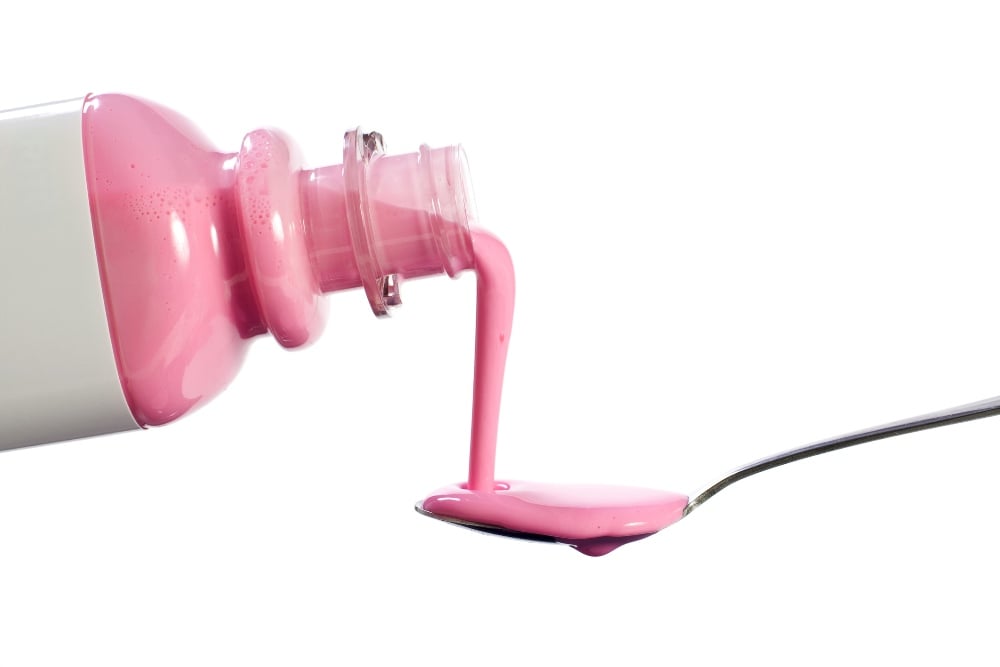Key Takeaways
- Pepto Bismol is an antacid and stomach soother popular among humans.
- You can give it to your dog for tummy trouble, with some precautions. Visit your vet first before administering Pepto Bismol.
- Some dogs should not be given Pepto Bismol, including puppies, those taking antibiotics or aspirin, and pregnant dogs.
Table of Contents
What is Pepto Bismol?
Pepto Bismol, or more generically known as bismuth subsalicylate, is an antacid and stomach soother popular among humans. But can it be used for dogs? The quick answer is yes, but with some reservations (and do not give to cats).
How Does Pepto Bismol Work?
Dogs frequently have GI issues – in fact, stomach complaints top the list of reasons why pet parents bring their dogs to the vet. For minor conditions that include indigestion, mild diarrhea, and gas, Pepto can help alleviate discomfort and in some cases, stop the symptoms.
How to Treat Dog Tummy Problems
An upset stomach can be caused by a number of things, such as stress or anxiety, switching to a new food, medication side effects, or consuming something they shouldn’t have. For dog tummy troubles, Pepto Bismol should not be the first attempt for treatment. Vet-recommended methods for treating mild stomach upset include:
- Do nothing. Wait 12-24 hours before giving your dog his next meal so his digestive system can recover. Make sure he continues to stay hydrated, especially if he has diarrhea.
- Add plain canned pumpkin to his food. Add 1 to 4 tablespoons per meal, depending on your dog’s size.
- Visit your veterinarian. If the condition continues for more than 24 hours or worsens, contact your vet.
Severe or prolonged conditions need to be treated by a vet, however, so don’t administer any OTC medications until you’ve consulted your pup’s doctor. Knowing what your pet has gotten into can help tremendously when visiting the vet, as diarrhea can come from a myriad of sources. Remember – if your dog has had diarrhea for more than a day, or is exhibiting any of the following symptoms, go to the vet:
- Vomiting
- Lethargy, wobbliness
- Loss of appetite
- Very dark to black stools
- Stools mixed with blood or mucus

Pepto Bismol Dosage by Weight
- Liquid dosage: The recommended dosage is 1 teaspoon for every 10 pounds. It can be offered to the dog every 6 to 8 hours. (Regular Strength Pepto Bismol Liquid)
| Dog’s weight | Liquid Pepto Bismol dosage |
| 10 pounds | 1 teaspoon |
| 11-20 pounds | 2 teaspoons |
| 21-30 pounds | 3 teaspoons (1 tablespoon) |
| 31-40 pounds | 4 teaspoons |
| 41-50 pounds | 5 teaspoons |
| 51-60 pounds | 6 teaspoons (2 tablespoons) |
| 61-70 pounds | 7 teaspoons |
- Chewable tablet dosage: When giving the chewable tablets to your dog, it’s recommended that the medicine is administered at a dosage of 8.75 mg per 1 pound (Regular Strength Pepto Bismol Chewable Tablets). If you’re unsure how to calculate the tablet dosage for your dog, your vet can help you.
| Dog’s weight | Tablet Pepto Bismol dosage |
| 10 pounds | 87 mg |
| 20 pounds | 175 mg |
| 30 pounds | 262 mg |
| 40 pounds | 350 mg |
| 50 pounds | 437 mg |
| 60 pounds | 525 mg |
| 70 pounds | 612 mg |
NOTE: If your dog still has diarrhea after a few doses, stop the medication and call your veterinarian.
Pepto is not a flavor beloved by dogs, so dosing them requires some tricks. Use an empty (no needle) plastic syringe to give your dog the medication. Holding your dog’s head in its normal position, gently pull your dog’s upper lip back to expose the upper teeth. Place the syringe just behind the upper canine tooth, then position the syringe so that it is just inside the mouth and angled toward your dog’s throat. Slowly push the plunger, then gently hold his muzzle closed for a second to ensure he swallows it.
AKC’s Chief Veterinary Officer Dr. Jerry Klein says he rarely mentions Pepto to patients because the formula’s salicylates could cause gastric bleeding, and the bismuth in the medication can turn the stool black, which in turn may mask any gastric bleeding: “If it must be given, offer no more than one or two doses after consulting with your veterinarian.”
The following dogs should not take Pepto:
- Those with allergies to any of the active ingredients
- Pregnant pooches, or those who are nursing puppies
- Those with special medical conditions, particularly those with one of several canine bleeding disorders
- Those who are currently taking antibiotics, aspirin or non-steroidal anti-inflammatory agents (NSAIDs) such as Rimadyl and Deramaxx. Talk to your vet about your dog’s current medications before giving your dog Pepto.
- Puppies, because they are at risk for dehydration with diarrhea. Take your puppy directly to the vet first
A safer choice is a bismuth subsalicylate product formulated especially for dogs called Corrective Suspension, which is only available via your vet.
Pepto Bismol FAQs
Veterinarian, Dr. JoAnna Pendergrass answers some common questions.
What kind of Pepto-Bismol is safe for dogs?
Pepto-Bismol is formulated as a liquid or chewable tablet. Either formulation is safe for dogs when given in the proper dosage and with veterinary instruction. The ‘dog’ dosage is 1 teaspoon per 10 pounds for liquid Pepto-Bismol and 8.75 milligrams per 1 pound for chewable Pepto-Bismol.
Call your veterinarian before giving your dog Pepto-Bismol. They will be able to calculate the proper dosage for your dog according to your dog’s weight and which formulation you plan to give.
How long does it take Pepto to kick in for dogs?
There is not a definitive time for Pepto to start working to relieve a dog’s upset stomach. After you have spoken to your vet about giving your dog Pepto Bismol, contact them again if your dog’s symptoms have not improved after a few doses.
Can I give pepto bismol to my pregnant or nursing female?
No. Pepto-Bismol should not be given to your dog if she is pregnant or nursing.
What is the best OTC medicine for a dog’s upset stomach?
There’s not a single best OTC medicine for relieving a dog’s upset stomach. Other OTC options include Imodium (loperamide) and Pepcid (famotidine). Talk with your veterinarian before giving your dog any OTC medicine; they will be able to recommend a medicine for your dog and calculate the proper dosage according to your dog’s weight.
What can dogs eat or drink for an upset stomach?
If your dog has an upset stomach, water is the best liquid for them to drink. Water is essential to keep your dog hydrated while their digestive system gets back to normal.
Bland foods, such as unseasoned pumpkin and white rice, are ideal for dogs with an upset stomach. Other bland food options include unseasoned shredded chicken, plain yogurt, and oatmeal. Your veterinarian may recommend that you wait about 12 to 24 hours (while continuing to offer water) before offering food to your dog to allow their upset stomach to resolve.
Side Effects of Pepto Bismol in Dogs
Side effects are rare and usually mild, though it’s important to consider the potential side effects before giving this medication to your dog. The most common side effects are:
- Constipation: Large doses or prolonged use can cause constipation in dogs.
- Change in stool color (grey, black, or green): Pepto Bismol contains bismuth which can darken the stool.
- Loss of appetite: Pepto Bismol can cause your dog to lose interest in food.
If your dog exhibits shortness of breath or starts acting “off,” get to an emergency vet clinic immediately and let them know any prescription drugs he’s on, including the Pepto. They can check for gastric bleeding or other rare complications.
Can My Dog Overdose on Pepto Bismol?
If your dog consumes too much Pepto Bismol, it necessitates a veterinary emergency. In high enough quantities, the compounds in this medication can poison a dog and may even be life-threatening. Signs of overdose include:
- Diarrhea or bloody stool
- Vomiting
- Fever
- Rapid breathing
- Tremors, seizures, or collapse
Toxic ingestion emergencies: If your dog has overdosed, call or visit your local veterinarian or emergency veterinary hospital immediately.
Alternative to Pepto Bismol for Dog Stomach Issues
There are a few other at-home remedies for tummy troubles you can try with your dog. Before trying a new medication, be sure to always consult with your veterinarian.
- Imodium (loperamide) is an over-the-counter medication that can help with diarrhea. The Imodium dosage for dogs is 2 milligrams per 40 pounds of body weight, 2-3 times per day for the tablet form. Be sure to consult with your veterinarian first to verify that it’s safe to give your dog Imodium based on his or her medical history.
- Pepcid (famotidine) is another OTC medication that prevents acid buildup by decreasing acid production in the stomach. The dosage of Pepcid for both dogs and cats is 10 milligrams for every 20 pounds of body weight one to two times per day. Only purchase the original strength Pepcid, as “Pepcid Complete” contains a combination of medications.
- Plain canned pumpkin (no spices added) can also help relieve both constipation and diarrhea. Depending on your dog’s size, add 1/2 to 4 tablespoons of pumpkin to your dog’s meals. Your vet can advise you on how much pumpkin to give your dog.
If your dog’s tummy troubles last more than two days, stop your at-home treatments and take your pup to the vet. It’s important to determine the underlying cause in order to properly treat the illness.
The content is not intended to be a substitute for professional veterinarian advice, diagnosis, or treatment. Always seek the advice of your veterinarian or other qualified health provider with any questions you may have regarding a medical diagnosis, condition, or treatment options.
Want to make sure your pets are covered from those unexpected illnesses or injuries with no limits on payouts? Get a quote and make sure you’re covered for those dog and puppy mishaps and unpleasant surprises.









